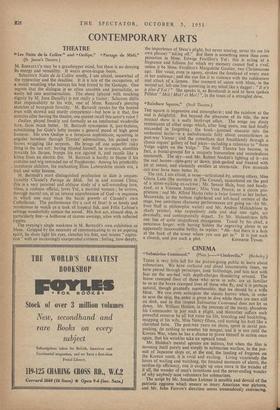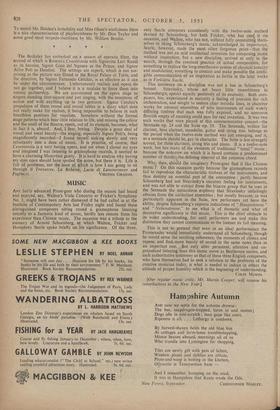CINEMA
"SubmOrine Command." (Plaza.)__.__" Cinderella." (Berkeley.) THERE is very little left for the picture-going public to learn about submarines. We have surfaced and dived innumerable times, we have peered through periscopes, sunk battleships, and lain taut with fear on the sea-bed with depth-charges thundering around. The brave cramped lives of those who serve in subs, are as familiar to us as the brave cramped lives of those who fly, and it is perhaps natural, though grantedly reprehensible, that we should be a trifle blasé. We can even anticipate the classic horror when, in order to save the ship, the order is given to dive while there are men still on deck, and in this respect Submarine Command does not let us down. Mr. William Holden, in the interests of the many, abandons his Commander in just such a plight, and thereafter suffers such powerful remorse he all but ruins his life, brooding and backbiting, snapping at his wife, Miss Nancy Olsen, and nursing his hurt like a cherished babe. The post-war years on shore, spent in naval pen- pushing, do nothing to sweeten his temper, and it is not until the Korean War, when he has a chance to prove himself in action once again, that his wrinkles take an upward trend.
Mr. Holden's mental agonies are tedious, but when the film is devoting itself purely and simply to submarine warfare, to the pur- suit of Japanese ships Or, at the end, the landing of frogmen on the Korean coast, it is vivid and exciting. Living vicariously the hours of waiting and watching, the frenzied moments of alarm, the sardine-tip efficiency, one is caught up once more in the wonder of it all, the wonder of man's inventions and the never-ending wonder of why anybody sane volunteers for submarines.
The script by Mr. Jonathan Latimer is sensible and devoid of the patriotic egginess which smears so many American war pictures, and Mr. John Farrow's direction seems tremendously convincing.
To match Mr. Holden's irritability and Miss Olsen's wistfulness there is a nice characterisation of playboyishness by Mr. Don Taylor and some good stout torpedo-manliness by Mr. William Bendix.
The Berkeley has embarked on a season of operatic films, the second of which is Rossini's Cenerintola with Signorina Lori Randi as its heroine, Signor Gino del Signore as the Prince, and Signor Alfro Poli as Dandini. The settings are superb, which is not sur- prising as the picture was filmed in the Royal Palace at Turin, and the direction, by Signor Fernando Cerchio, is as effective as it can be under the circumstances. Unfortunately realism and opera do not go together, and I believe it is a mistake to force them into uneasy partnership. We are accustomed on the opera stage to singers standing four-square and just singing, with the minimum of action and with anything up to two gestures. Signor Cerchio's propulsion of them round and round tables in a dizzy whirl does not really make for realism, it being impossible to believe in such breathless pastimes for vocalists. Somehow without the formal stage patterns which bear little relation to life, and missing the colour and the smell of the theatre, opera, out of its element, becomes, what in fact it is, absurd. And, I fear, boring. Despite a great deal of visual and vocal beauty—the singing, especially Signor Poli's, being magnificently recorded—I found myself sinking slowly and very reluctantly into a daze of ennui. It is possible' of course; that Cenerentola is a very boring opera, and yet when I closed my eyes and imagined I was listening to gramophone records, it seerned to have a charming Mozartian gaiety. It is hard to analyse why having my eyes open should have spoiled the score, but there it is. Life is full of problems, not the least of which is how I am going to sit through 11 Trovatore, La Boheme, Lucia di Lanunermoor and






















































 Previous page
Previous page